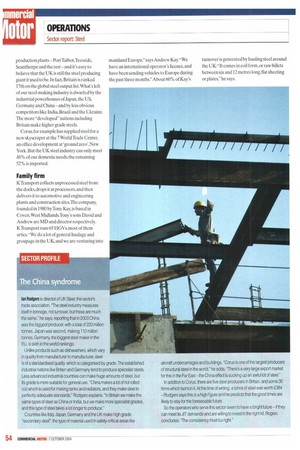SECTOR PROFILE Ian Rodgers is director of UK Steel, the
Page 54

If you've noticed an error in this article please click here to report it so we can fix it.
sectors trade association. 'The steel industry measures itself in tonnage, not turnover, but these are much the same," he says, reporting that in 2003 China was the biggest producer, with a total of 220 million tonnes. Japan was second, making 110 million tonnes. Germany, the biggest steel maker in the EU, is sixth in the world rankings.
Unlike products such as dishwashers, which vary in quality from manufacturer to manufacturer, steel is of a standardised quality which is categorised by grade. The established industrial nations like Britain and Germany tend to produce specialist steels. Less advanced industrial countries can make huge amounts of steel, but its grade is more suitable for general use. "China makes a lot of hot rolled coil which is used for making tanks and radiators, and they make steel to perfectly adequate standards,' Rodgers explains. "In Britain we make the same types of steel as China or India, but we make more specialist grades, and this type of steel takes a lot longer to produce," Countries like Italy, Japan, Germany and the UK make high grade °secondary steel": the type of material used in safety-critical areas like aircraft undercarriages and buildings. "Corus is one of the largest producers of structural steel in the wand," he adds. 'There's a very large export market for this in the Far East the China effect is sucking up an awful lot of steel."
In addition to Carus, there are five steel producers in Britain, and some 30 firms which fashion it At the time of writing, a tome of steel was worth £384 —Rodgers says this is a high figure and he predicts that the good times are likely to stay for the foreseeable future.
So the operators who serve this sector seem to have a bright future— if they can meet its JlT demands and are willing to invest in the right kit Rogers concludes: 'The consistency must be right."






























































































































































































